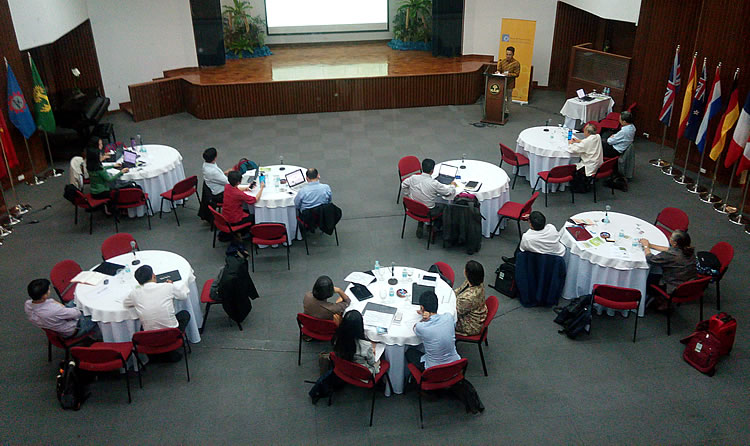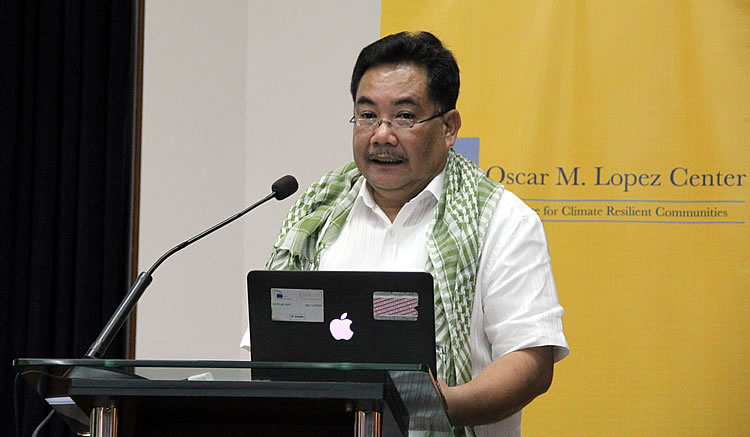 This was the warning of Dr. Segfredo R. Serrano, undersecretary for policy and planning of the Philippines Department of Agriculture, as he clamored for longterm and sustainable plans for climate change adaptation (CCA) amid the worsening impacts of the global phenomenon on the vulnerable sectors comprising farmers and rural communities. Serrano delivered his keynote presentation in a writeshop attended by participants from Cambodia, Indonesia, the Philippines, Thailand, and Vietnam who hold key and staff positions in decision-making, policy formulation, research, and in other relevant CCA sectors in their countries.
This was the warning of Dr. Segfredo R. Serrano, undersecretary for policy and planning of the Philippines Department of Agriculture, as he clamored for longterm and sustainable plans for climate change adaptation (CCA) amid the worsening impacts of the global phenomenon on the vulnerable sectors comprising farmers and rural communities. Serrano delivered his keynote presentation in a writeshop attended by participants from Cambodia, Indonesia, the Philippines, Thailand, and Vietnam who hold key and staff positions in decision-making, policy formulation, research, and in other relevant CCA sectors in their countries.
The Policy Enabling Environment and Climate Change Adaptation in Inclusive and Sustainable Agricultural and Rural Development (ISARD): Second Knowledge Sharing Writeshop took place at the Southeast Asian Regional Center for Graduate Study and Research in Agriculture (SEARCA) Headquarters in Los Baños, Laguna on 13-15 April 2016.
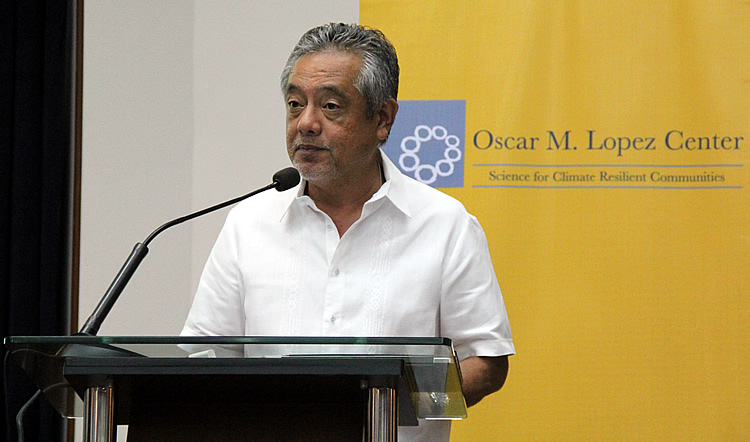 Meanwhile, Dr. Gil C. Saguiguit, SEARCA Director, stressed in his welcome remarks the urgency of the need to apply science into CCA policy and plans; as well as the integration of CCA best practices into programs and actions to contribute to heightened climate change resiliency among all important sectors in which people depend for their food and livelihood.
Meanwhile, Dr. Gil C. Saguiguit, SEARCA Director, stressed in his welcome remarks the urgency of the need to apply science into CCA policy and plans; as well as the integration of CCA best practices into programs and actions to contribute to heightened climate change resiliency among all important sectors in which people depend for their food and livelihood.
In order to respond to the adverse impacts of climate change in the ASEAN Region and to come up with a collective region-wide action plan to reduce its potential damage, key people and experts on climate change, the environment, and agriculture across the region gathered in this writeshop to synthesize the experiences and lessons learned by ASEAN countries on mainstreaming climate change adaptation (CCA) in their national development plans and strategies.
The Fifth Assessment Report of the Intergovernmental Panel on Climate Change (IPCC AR5) provided more comprehensive science-based facts and evidences proving that climate change is indeed largely induced by human-related activities. IPCC AR5 further revealed that climate-related disasters are among the main drivers of food insecurity, both in the aftermath of a disaster and in the long run. Drought is a major driver of food insecurity, and contributes to a negative impact on nutrition. Floods and tropical storms, on the other hand, affect food security by destroying livelihood assets.
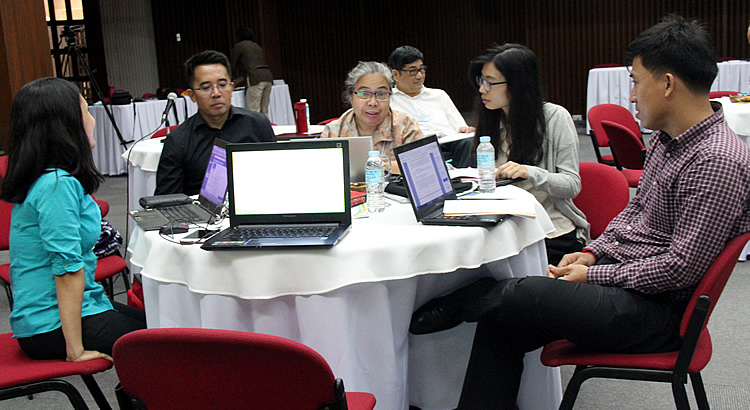 The IPCC also pointed out that effective adaptation implementation depends on policies and cooperation at all scales and it can be enhanced through integrated responses that link mitigation and adaptation with other societal objectives. The IPCC defines Climate Change Adaptation (CCA) as “adjustments in ecological, social, or economic systems in response to actual or expected climatic stimuli and their effects or impacts. It refers to changes in processes, practices, and structures to moderate potential damages or to benefit from opportunities associated with climate change".
The IPCC also pointed out that effective adaptation implementation depends on policies and cooperation at all scales and it can be enhanced through integrated responses that link mitigation and adaptation with other societal objectives. The IPCC defines Climate Change Adaptation (CCA) as “adjustments in ecological, social, or economic systems in response to actual or expected climatic stimuli and their effects or impacts. It refers to changes in processes, practices, and structures to moderate potential damages or to benefit from opportunities associated with climate change".
Different countries in Southeast Asia are involved in various degrees of mainstreaming or integrating CCA into their national development plans and strategies, which are translated at various hierarchical levels. These are reflected in their National Adaptation Programs of Action (NAPAs), Strategic Program for Climate Resilience (SPCRs) and National Development Plans. The formulation of these various plans and how effectively it is translated into the national development plans and implemented at various hierarchical levels is of extreme interest in the region in terms of sharing knowledge on what worked and what needs to be improved to increase the effectiveness of the policy enabling environment for CCA.
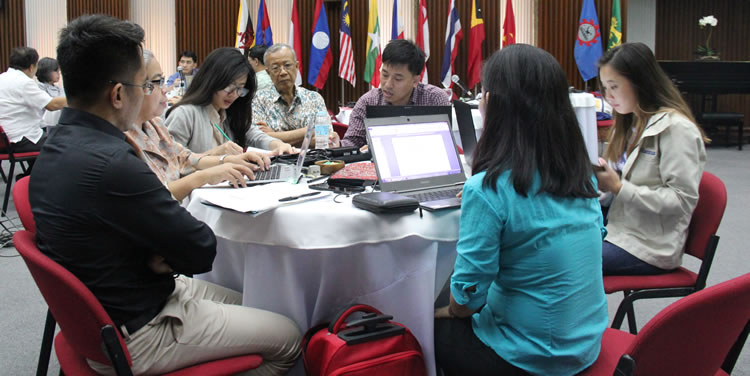 Aside from sharing of knowledge and experiences for the formulation and implementation of top level policy on CCA by various countries in SEA, the writeshop also provided room for identifying opportunities and modalities to foster collaboration and networking among CCA stakeholders and thus consolidate information on the process involved in formulating a policy enabling environment. It also assisted the participants on coming up with possible indicators to assess the effectiveness of a policy environment which can promote CCA at various hierarchical levels.
Aside from sharing of knowledge and experiences for the formulation and implementation of top level policy on CCA by various countries in SEA, the writeshop also provided room for identifying opportunities and modalities to foster collaboration and networking among CCA stakeholders and thus consolidate information on the process involved in formulating a policy enabling environment. It also assisted the participants on coming up with possible indicators to assess the effectiveness of a policy environment which can promote CCA at various hierarchical levels.
A synthesis report on lessons learned regarding the processes involved in formulating an effective enabling policy environment for promoting CCA through the case stories presented by the participants is expected to be consolidated as a publication that can serve as guide for policy and decision makers, researchers, and development practitioners on their work on CCA. SEARCA’s Knowledge Management Department-Training Unit, in cooperation with the Oscar M. Lopez Center for Climate Change Adaptation and Disaster Risk Management Foundation, Inc., led by its Scientific Director Dr. Rodel D. Lasco, organized the writeshop. Dr. Percy E. Sajise, respected ecologist, former SEARCA director, and current SEARCA Senior Fellow, served as writeshop technical coordinator. (Kaymart A. Gimutao)
